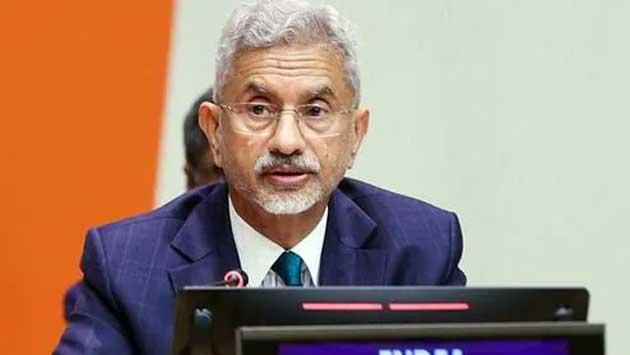Reply To:
Name - Reply Comment
 New York, Sep 26 (Hindustan Times) - India does not seek to control every political move of neighbours, and does not expect that the political dynamics within neighbouring countries will adhere to what India may think is desirable, but Delhi is confident that fundamental realities of interdependence will ensure that relationships with neighbours remains constructive and positive, external affairs minister S Jaishankar has said.
New York, Sep 26 (Hindustan Times) - India does not seek to control every political move of neighbours, and does not expect that the political dynamics within neighbouring countries will adhere to what India may think is desirable, but Delhi is confident that fundamental realities of interdependence will ensure that relationships with neighbours remains constructive and positive, external affairs minister S Jaishankar has said.
At a time when a regime change in Bangladesh through street protests and a government change in Sri Lanka through electoral route has generated questions about Dhaka and Colombo’s ties with Delhi, Jaishankar also made it clear that India remains focused on building economic regionalism in South Asia.
During a conversation at Asia Society in New York, the minister was asked about India’s “non-reciprocal” approach to neighbours hasn’t yielded benefits with the rise of potentially governments, and about India’s role regarding the treatment of minorities in Bangladesh.
Jaishankar said that India stepped forward in the case of Sri Lanka at a time when others didn’t -- in a timely manner and on scale -- and that helped stabilised the island state’s economy. “When we did it, we did not have a political conditionality that accompanied it. We were doing it as a good neighbour that did not want to see an economic meltdown at the doorstep. What happens politically in Sri Lanka is for their politics to work out. At the end of the day, each one of our neighbours will have their own dynamics. It is not our intention to suggest that their dynamics must necessarily adhere to what we might consider being better for us.” He added that this was a “real world”, everyone made their choices and countries then found a way to adjust and work together.
Over the weekend, elections in Sri Lanka saw the victory of Anura Kumara Dissanayake, the leader of the Janata Vimukhti Peramuna (JVP), an old Marxist party, as a part of wider coalition. While India has engaged with Dissanayake — both before and after the election — his past critical positions on elements of Indian policy and economic interests, at a time of China’s continued engagement, have given rise to apprehensions about Colombo’s approach to India under a new dispensation.
In the case of Bangladesh, which he acknowledged as being a different situation, the ministers traced back the progress of the past decade.
“What we have done is to do projects that have been good for both of us. Economic activity has overall picked up. Logistics of that region has improved. I would urge you not to be deterministic about it. It is not as if India is seeking to control every political move of every neighbour. That’s not how it works. It doesn’t work for us and it doesn’t work for anyone else.”
In Bangladesh, student protests and a brutal state response morphed into a mass upsurge against the Sheikh Hasina-led government that was widely seen as authoritarian and corrupt and having presided over unfair elections. Hasina had to flee to India, which had traditionally supported her party, the Awami League. This, in turn, has made India an object of suspicion in Bangladesh’s new political configuration. For its part, Delhi has been deeply concerned about the manner of regime change in the country, the rise of Islamist forces as a part of the new political dispensation, the possibility of state sipport to radicalisation, the attacks on Hindus in Bangladesh, the political instability in the country, and the potential security consequences for India especially in the Northeast. Jaishankar met Bangladesh’s new foreign advisor in the interim government, Touhid Hossain, on Monday in New York.
Jaishankar said that in foreign policy, all that a country could do was read, anticipate and respond to those dynamics. He then projected a more confident outlook for the future. “The realities of interdependence, mutual benefit and our ability to get along will serve both our interests will reassert themselves. That has been the history,” he said. “Look back at the last few years. Something happens and people suggest it is an irretrievable situation. Then you see the correctives manifest itself. I am quite confident that in both these cases, our relationship will remain positive and constructive.”